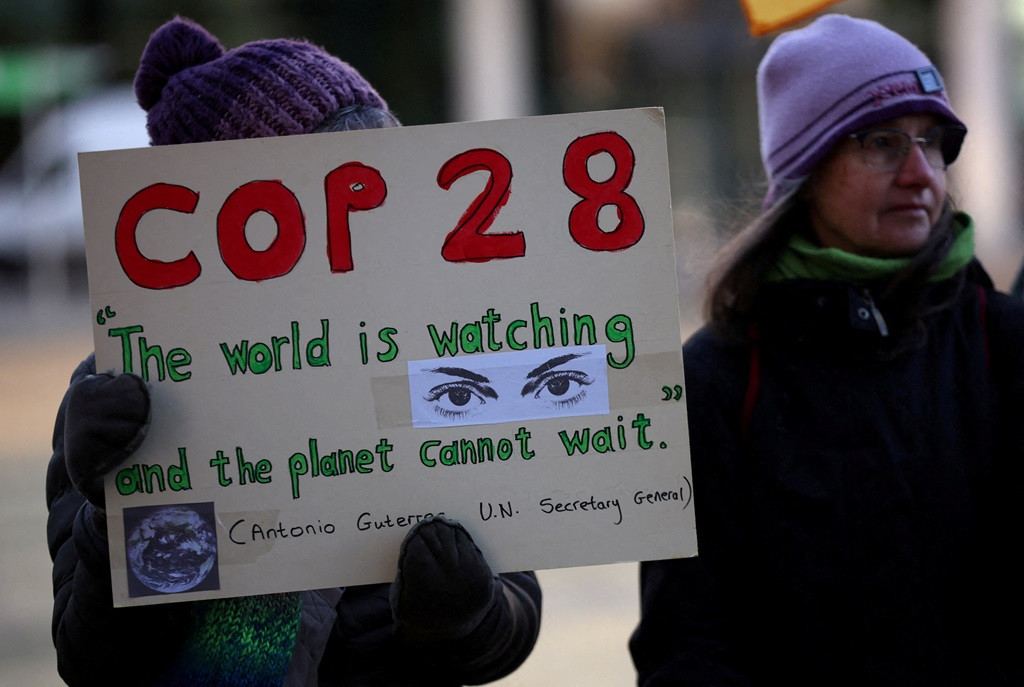Popular Reads
Top Results
Can't find what you're looking for?
View all search resultsPopular Reads
Top Results
Can't find what you're looking for?
View all search resultsCOP28 lines up new climate pledges, but do they work?
Experts warning that if unfulfilled, side deals during the climate summit would risk undermining trust in the core UN climate negotiations.
Change text size
Gift Premium Articles
to Anyone
While the world's climate diplomats huddle over draft decisions to be made at the end of this year's United Nations climate summit, governments at COP28 are firing off a flurry of new promises for action.
Among the expected pledges at COP28 are a goal to triple renewable energy capacity and initiatives on methane and coal power. These voluntary side deals have proliferated in recent years, even as global temperatures and greenhouse gas emissions continue to rise.
Unlike official summit decisions, which must be passed by consensus among the nearly 200 countries, voluntary pledges can be made quickly, and boldly, without the worry of one party objecting.
"They go much further than what you can do multilaterally," said Marc Vanheukelen, a former European Union official who led the bloc's work on an international methane emissions pledge launched at the COP26 climate summit in 2021.
Analysis of some of the COP pledges backed by substantial groups of countries or funders suggests they did lead to stronger action to curb climate change. Others have struggled, with experts warning that if unfulfilled, COP side deals risk undermining trust in the core UN climate negotiations.
"Often, these are exercises in what you could call 'fire and forget'," said Vanheukelen. Countries will fire off a statement of support, but then "you don't watch anymore what is happening to it".
Here is how some of the biggest voluntary pledges from recent years are faring today:
Global methane pledge
Among the side deals announced at the COP26 climate summit in Glasgow in 2021, the U.S. and EU led more than 100 countries in committing to cutting methane emissions 30 percent by 2030.
Methane is responsible for around 30 percent of human-caused global warming since the industrial revolution. A potent greenhouse gas, it leaches into the atmosphere from leaky oil and gas infrastructure, livestock burps and manure, and landfill sites.
Supporters credit the Global Methane Pledge with raising the profile of the potent greenhouse gas, which governments including the EU, Nigeria and Canada have since introduced or strengthened regulation of.
The United States and China have also made methane a topic of shared efforts, although China and other major emitters including Russia have not backed the pledge.
Groups tracking the pledge say it's too early to gauge success by emissions levels, as policies passed since 2021 would take a few years to kick in. Methane emissions from the oil and gas industry increased slightly last year alongside rising fuel production.
"It's now about the actions that are being teed up. It's about the finance systems that are being created," said Jonathan Banks, global director on methane at the non-profit Clean Air Task Force, pointing to funding announcements expected at COP28.
Reuters previously reported the World Bank is expected during the summit to new launch a fund, with backing from oil companies among others, to finance methane leak detection and cleanup programs in developing countries.
Fossil fuel finance
More than 30 governments including the US and Canada committed at COP26 to stop financing international fossil fuel projects by the end of 2022, the first international political deal to halt overseas oil and gas finance.
By end-2022, Canada, Britain, France and others had national policies in place to meet this goal, according to campaign group Oil Change International (OCI), estimating that the moves altogether have shifted some US$5.7 billion away from fossil fuel projects toward clean energy.
"This initiative has done relatively well and has demonstrated real world progress," said OCI campaign manager Laurie van der Burg. "For many countries, they only started working on this after they joined the pledge."
Still, some countries blew past the deadline and continue to fund fossil fuels overseas, including the United States, Italy and Germany. The three altogether have put more than $4 billion into fossil fuels overseas since 2022, amid the Western drive to replace Russian gas, OCI said.
Halting deforestation
More than 140 governments, representing the vast majority of the world's forests, pledged at COP26 to end deforestation by 2030, underpinned by $19 billion in funding commitments.
The year after, in 2022, deforestation increased by 4 percent worldwide, according to a coalition of environmental organizations including WWF, The Rainforest Alliance and Climate Focus.
"It's definitely not showing signs right now that it will succeed," said Erin Matson of Climate Focus, which advises governments and companies on emissions-cutting policies.
While Brazil has slashed deforestation in 2023, that trend came only after President Luiz Inácio Lula da Silva took office this year.
"The problem with these voluntary declarations is you don't nail out the nitty gritty in order to really get people to abide by it," Matson said, referring to details such as how progress might be measured.











